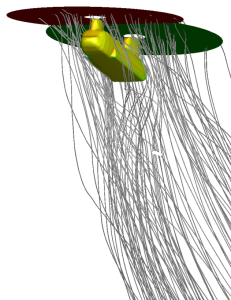Rotorcraft Engineering - Preliminary Design

This course aims to introduce guiding principles for efficient rotor design and, by extension, efficient rotorcraft (helicopters, eVTOLs, multirotors etc.). General qualitative understanding of rotorcraft concepts would be introduced during the course, so even students with no background in rotorcraft engineering are encouraged to enroll for the course. The goal of the course is to use simple momentum- and energy-based methods to perform quantitative analysis of helicopter performance during hover, climb and forward flight. The different rotor geometric and aerodynamic design parameters have a predominantly conflicting on the performance in different flight scenarios. This serves as the basis for optimising the design that results in lowest fuel consumption, for example, for a given mission. Gaining insight into fundamentals of rotary-wings (or rotors) and performing basic evaluations of different rotor concepts would be a recurring theme throughout the course. Concepts learned and insights gained in the course would serve as a basis for further studies in the field of helicopter technology with regard to any of the following areas: flight physics, detailed sizing and design, helicopter systems and safety.